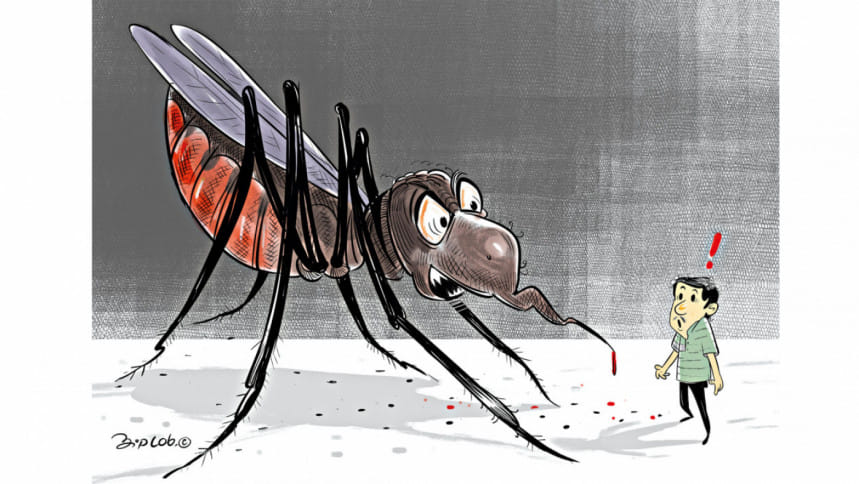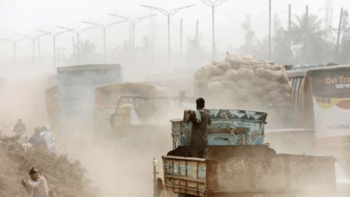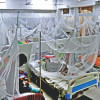In the mosquitoes’ den

The old saying "Raat e mosha din e machhi, ei niye Dhaka achhi (Mosquitoes at night and flies during the daytime, this is how we live in Dhaka city)" still resonates with the hapless residents of the captial city. Cannonballs cannot kill mosquitoes. Palms clash with each other, missing the target. The power of mosquitoes becomes real when we don't take shelter under a mosquito net at night. They attack en masse, outnumbering us. They lift us into the air with their repeated onslaughts. Mosquito-killing electric rackets and bare hands cannot wipe them out. Mosquito-repellent creams fail miserably. If we kill 10, we find a whole platoon waiting to pounce on us.
Even in well-off areas, mosquitoes show no mercy. They build their colonies in every conceivable place. They are very unbiased and objective in their approach. At night, they start a musical concert. The songs of mosquitoes hit our eardrums with an irritating monotony. We cannot help but endure the melody. The pesky creatures compel us to enjoy the rendition. Mosquito terrorism continues in full swing. Favourable breeding conditions cultivate their whole army. In the mosquito den, we are terrified by their bites.
In the washroom, mosquitoes sting the exposed body parts with their weapons. We have no option but to dance to the tune of mosquito music. Every place is taken over by the pesky dudes. If we focus on one, we find others busy sucking blood. The simultaneous movement of limbs helps bring some respite, albeit temporarily. The corpulent mosquitoes, with overfed bellies, become heavy, summoning their death. The red liquid is visible on their abdomens. Only one slap is enough to end their journey in this world. If we succeed in our mission, our palms bear a red mark with a tiny splash of blood.
Every corner of the world is their sanctuary—from the beach to the park. I was strolling on Cox's Bazar beach and found mosquitoes hovering above my head, forming a big ring. Once, while enjoying the natural beauty in a park in Sylhet, I was suddenly dragged down to reality by mosquito bites. I moved my legs, sitting under a concrete umbrella on a concrete bench, trying to drive them away. The situation did not improve at all. I was not allowed to enjoy the serenity of the green atmosphere. Finally, I had to start walking to avoid being bitten. No matter where we go, we find them waiting to unleash their irritating bites.
Mosques are also taken over by mosquitoes. While saying my evening prayer, I was once attacked from every direction. I could not move my limbs as I was praying. The immense helplessness was utilised by the mosquito community residing in that room. Time was running out for them. They had to finish sucking blood from my body before my prayer was over. Every minute was important for them since I had to remain motionless most of the time. Once the prayer was over, I regained control and managed to ward them off.
Exposed body parts become their grazing fields. By sucking too much blood from our bodies at a time, they preclude their flight. But their greed cannot surpass human lust for land and money. We feel safe and secure inside the mosquito net, which seems surreal. Mosquitoes clash against the walls of the net and retire for the time being. Once they sense the presence of resident victims outside the net, they resume their attack with their proboscises. When they suck our blood, we feel alive. Following Descartes, we can say: mosquitoes suck our blood; therefore, we are.
The battle has been fought since time immemorial. Unplanned urbanisation goes hand in hand with mosquito explosions. Their never-ending numbers continue to surprise us. We are shocked to see the tidal wave when we think they have perished to some extent. No matter where we are, we always get a warm welcome from the mosquitoes. Coils are placed under the table to help us enjoy candlelight dinners without disturbances from the bloodthirsty creatures.
Along with amenities, urban centres welcome us with mosquito bites. Because of the sweet smell of money in the capital, we tolerate the pain of living with mosquitoes. Lifelong relationships with them are difficult to erase from our photo albums. We pay the rent, and they get free access to our houses. Everyone—from people living on the footpath to those in posh buildings—becomes their easy target. Mosquitoes lurk outside the net, waiting to unleash their sting. They become jubilant once they find their prey.
Bats minimise the number of mosquitoes by gorging on them. I used to live in an area full of small bats, and I did not need to take any steps against the pesky creatures. Although bats look intimidating, their positive contribution to the environment is undeniable. Fumes are produced to drive away unwelcome intruders. To create a favourable environment, we must inhale the disturbing gas. The fogger machine cannot kill mosquitoes but successfully creates sound pollution. We sacrifice our blood to the mosquitoes. We must do it every day, whether we like it or not.
Because of their negative role, mosquitoes have no rights. It is as if the question of their having rights is beyond our imagination. Although animal rights activists wax lyrical about the rights of animals, they remain silent about safeguarding the rights of mosquitoes. Mosquitoes play an important role in the food chain. They have bongsho, which becomes evident in government directives. It says, "Moshar bongsho korun dhongsho (We should exterminate the mosquito colony)." Mosquitoes are witnesses to our highs and lows. Even if every creature leaves us, they will remain as a testimony to lasting companionship.
Mohammad Mahfuzul Islam is an anthropologist and faculty member at Independent University, Bangladesh (IUB).
Views expressed in this article are the author's own.
Follow The Daily Star Opinion on Facebook for the latest opinions, commentaries, and analyses by experts and professionals. To contribute your article or letter to The Daily Star Opinion, see our guidelines for submission.

 For all latest news, follow The Daily Star's Google News channel.
For all latest news, follow The Daily Star's Google News channel. 









Comments